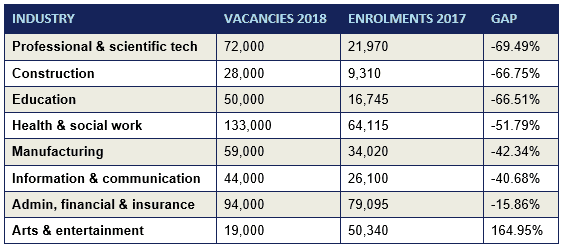Whether you are looking to fill traditional technology roles or roles straddling the entire gamut of cutting-edge digital technologies such as blockchain, data science, artificial intelligence and cybersecurity, the importance of STEM skills (Science, Technology, Engineering & Mathematics) cannot be over emphasized. The UK is no exception.
However, the shortage of STEM skills to fill these roles has become one of the most defining problems in the UK today. According to the Cybersecurity Skills and the UK’s Critical National Infrastructure (CNI) report from the Parliament’s Joint Committee on National Security Strategy the gap between demand and supply of such skills is a ‘”cause of alarm” for the Government. It further states that “a key challenge for education policy is the time lag between a pupil joining primary school and ultimately entering the workforce, and the extraordinary pace of technological evolution during the same period”.
Identifying the problem - student enrollments in STEM courses
As per a report by the Open University (The OU), 97% of the organizations working with STEM skills and 96% of the financial organizations have had difficulties in hiring skilled technology employees in the past 12 months. This is despite the fact that the average salary in the UK tech sector hovers around £62,500, which is far higher than the national average. The UK expects to create additional 142,000 new tech jobs by 2023; it is natural that hiring for these positions will become extremely tough and competitive.
 A research conducted by Bidwell recently, has thrown up interesting results. It attempted to assess the gap between the extant number of jobs within specific industry clusters and the number of student enrollments in courses. It was found that with the exception of the ‘Arts & Entertainment’ industry where the number of enrollments far outweigh the number of jobs available in the UK, every other sector including the ‘Professional & Scientific Technology’ and ‘Information & Communication” has more jobs on offer than the number of student enrollments. The number of vacancies in the ‘Professional & Scientific Technology’ domain exceeds the number of enrollments by 69.5%. Similarly for the ‘Information & Communication’ sector the gap between job vacancies and enrollments stands at upwards of 40%.
A research conducted by Bidwell recently, has thrown up interesting results. It attempted to assess the gap between the extant number of jobs within specific industry clusters and the number of student enrollments in courses. It was found that with the exception of the ‘Arts & Entertainment’ industry where the number of enrollments far outweigh the number of jobs available in the UK, every other sector including the ‘Professional & Scientific Technology’ and ‘Information & Communication” has more jobs on offer than the number of student enrollments. The number of vacancies in the ‘Professional & Scientific Technology’ domain exceeds the number of enrollments by 69.5%. Similarly for the ‘Information & Communication’ sector the gap between job vacancies and enrollments stands at upwards of 40%.
The impact of STEM skills shortage
It has been estimated by STEM Learning, one of the largest providers of education and career support in the UK that business leaders have reported a major shortage of staff with STEM skills.
Translated in value terms, this denotes an annual loss of £1.5bn incurred through recruitment, temporary staffing, training and inflated salaries. This has also resulted in a shortage of 173,000 workers, with an average of 10 unfilled positions per business.
Nine in ten businesses (89%) have reported that the average time taken to fill one position has increased by 31 days. This has resulted in businesses turning towards more expensive staffing solutions (74%), hiring more junior level people 65%), and setting up in-house training facilities for their employees (83%).
According to the research, many businesses are actually looking for talent outside the UK (48%) and the EU Referendum is further going to put a squeeze on talent availability (63%).
Steps taken by the Government & the industry
While a spate of steps have been taken by the Government in the past 2-3 years, a lot more has to be done. Take for example the introduction of the ‘T Levels’. The Government has planned to introduce the T-Levels from 2020 onwards which will be deemed to be similar to the current A-Levels. New specialist education institutions – National College for Digital Skills and the Institute for Coding have been established. Apprenticeships have also been instituted and are being promoted by the GCHQ through its National Cyber Security Centre (Cyber First Programme). The Government has also launched the £24mn ‘Opportunity North East’ to boost social mobility and access to talent from the North East of England.
Diversity is the key
In order to improve the ratio of girls to boys in the UK technology sector, a campaign called WISE was launched in January, 2019. This programme aims at improving the gender balance in STEM skill-bank across the country. A new online resource named ‘MySkillsMyLife’ was launched aimed at girls between 11 and 19 years of age. The game helps girls identify themselves with the kind of roles STEM education can lead them to. It aims to reach 200,000 girls across the country. Leading UK corporate entities – Broadcom, Goldman Sachs, BAE Systems, Network Rail, The UK Space Agency etc have contributed to the development of the resource. Similarly, the British International Education Association has launched the International STEM Youth Innovation Competition aided by Microsoft, ZSL and the Royal Institute.











